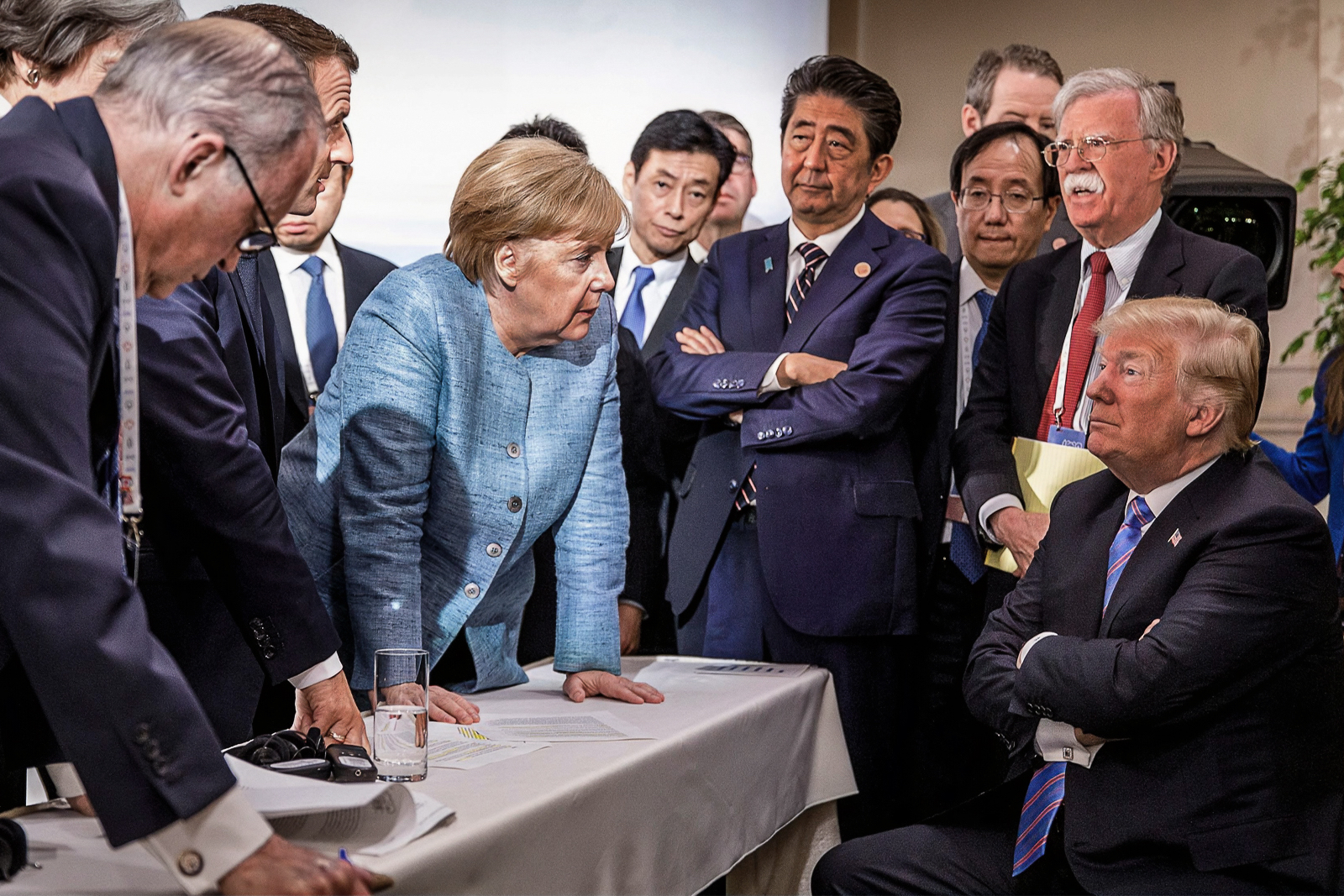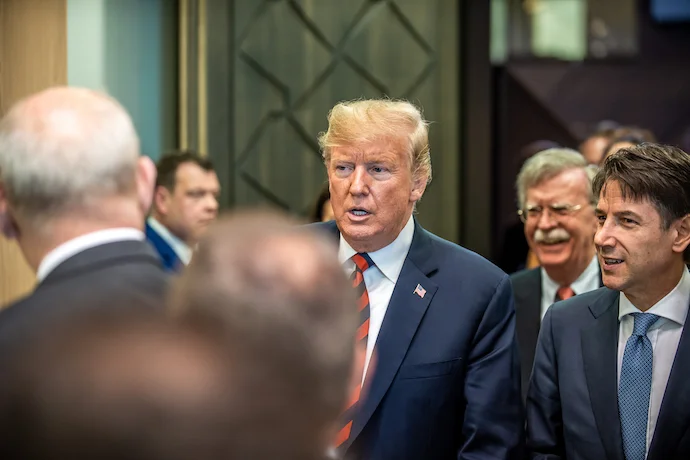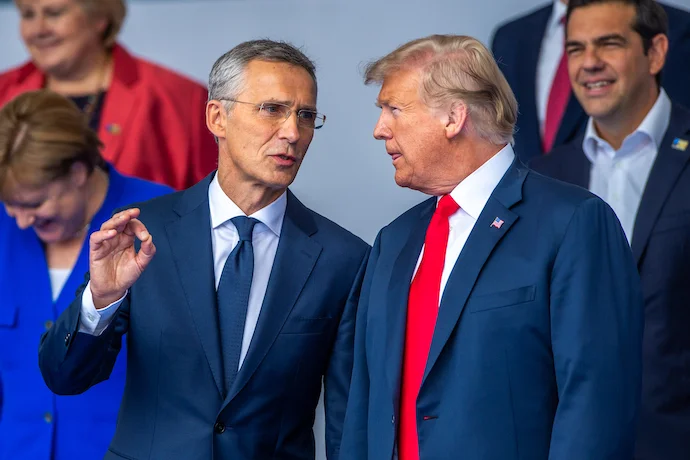
Europe Comes to Terms with Donald Trump’s Victory
In the wake of Donald Trump’s stunning re-election, his call for “unity” rings hollow in a political climate more fractured than ever. The chaotic election season has left Trump as divisive as he was in his first term, with global reactions ranging from grim foreboding to measured optimism.
Nowhere is this division more apparent than in Europe, where political leaders are grappling with what another four years of Trump will mean for transatlantic relations, global stability, and the future of liberal democracy.
European Commission President Ursula von der Leyen wasted no time in sending Trump a message of congratulation, emphasizing the historic depth of the transatlantic bond. The EU and the United States “are more than just allies,” she stated. “We are bound by a true partnership between our people, uniting 800 million citizens. This bond runs deep, rooted in our shared history, commitment to freedom and democracy, and common goals of security and opportunity for all.”
Ursula von der Leyen’s call for continued collaboration underscored the necessity of joint efforts to maintain economic dynamism and global security. “Let us work together on a transatlantic partnership that continues to deliver for our citizens. Millions of jobs and billions in trade and investment on each side of the Atlantic depend on the dynamism and stability of our economic relationship.”
Despite these hopeful, some might say naïve overtures, seasoned commentators like Paul Taylor, a senior fellow at the European Policy Centre, paint a much darker picture. “There is nothing but bad news for Europe in Donald Trump’s victory,” he asserts, predicting a litany of challenges, from undermining NATO and emboldening nationalist leaders like Viktor Orbán to escalating transatlantic trade tensions, the risks are profound.
“The only question is just how bad it will get. Europeans stand to suffer strategically, economically and politically from his ‘America First’ policies, as well as from his unpredictability and transactional approach to global affairs. The undermining of NATO, the emboldening of illiberal nationalists everywhere, a transatlantic trade war, and a battle over European regulation of U.S. social media platforms, AI and cryptocurrencies are just some of the major risks of a second Trump presidency,” Taylor added.

The prospect of a Trump-led “illiberal internationale” is particularly concerning, with mainstream European conservatives potentially drifting further right on issues such as migration and gender rights. For Taylor, the EU and UK must urgently move beyond their current “timid foreplay” and forge a robust alliance to counter these threats—a call to action largely unheeded thus far.
Thomas Waitz, co-chair of the European Green Party, branded Trump’s astonishing win as “a dark day in the U.S. and globally.”
“President-elect Trump, and his authoritarian policies, represent a real threat to freedom of speech and to democratic institutions. Europe must respond with more democracy and more global solidarity. We will keep resisting the far-right the world over and continue to build alliances to fight it. In a world of fear, the EU must become a beacon of hope,” said Waitz.
Not all voices in Europe are as pessimistic. David McAllister, a German MEP who chairs the European Parliament’s Foreign Affairs Committee, acknowledged the turbulence of Trump’s first term but urged continued engagement. “Even if our interests do not always coincide, no other international partner is as close to us as the U.S.,” he stated, calling for Europe to enhance its defense capabilities and strengthen its role within NATO. For McAllister, the geopolitical stakes demand a proactive exploration of shared interests, even in the face of Trump’s unpredictability.
Trade, long a contentious issue under Trump’s “America First” doctrine, remains a focal point. McAllister advocates leveraging the EU-U.S. Trade and Technology Council to address disputes such as American tariffs on European steel and aluminum. “The EU must be prepared to defend our interests vigorously, while developing our bilateral relations through dialogue,” he emphasized, warning of Trump’s threats to impose steep sanctions on European products. Still, he maintained that dialogue should take precedence, with retaliation reserved as a last resort.
“We should take Mr. Trump’s threats to impose sanctions of 10 percent or even up to 20 percent on all European products seriously and be prepared to signal early on that the European Union is equipped with the tools to respond to such measures,” McAllister added.
Meanwhile, Edward McMillan-Scott, a former British MEP, described Trump’s re-election as “disturbing,” citing the unprecedented consolidation of power under a president who now effectively controls all branches of government.
“[Trump] is often gnomic and has a knack for surprise and luck. Relations with the EU are at three levels: the political, which he has derided and the military, represented through NATO – although it maintains a 24-hour situation room with the EU Commission – and trade, where he has threatened a tariff war. All of this makes for an uneasy time for Europe, whose diplomats will be searching for mechanisms of detente, a word much used during the Cold War for easing tensions,” McMillan-Scott warned, from political and military alliances to trade disputes, where Trump’s penchant for brinkmanship poses a persistent challenge.
On Trump’s election, Sir Graham Watson, a respected former Liberal group leader in the EU Parliament is also filled with dread, saying, “America’s vote shows that countries continue to pull apart when the challenges to humankind urgently need people to pull together. On climate, on peace building and on the trade which creates wealth a second Trump presidency threatens to damage us all. The case for Europe to unite further is as strong as ever.”
Across Europe’s political spectrum, concern about Trump’s return is palpable. Watson’s concerns are shared by German Greens MEP Daniel Freund who notes, “All those who say we made it through 4 years of Trump before underestimate what is happening. Not only is Trump back in the White House, the Republican Party controls the U.S. Senate and the House of Representatives. Trump has a solid super conservative majority on the U.S. Supreme Court. And this time they have a plan with Project 2025.”
Daniel Freund doesn’t mince words: “I fear for American democracy. I fear for Ukraine. I fear for European security and trade.”
Spanish Socialist leader Iratxe García Pérez echoes Freund’s call for unity among Europe’s democratic forces, urging a strong multilateral agenda to address global challenges. Pérez’s suggested, “Democratic and progressive forces must work together on a strong multilateral and transatlantic agenda which delivers for and protects our citizens. Europe needs to show leadership to face global challenges and work for peace and stability.”

For Mélanie Vogel, co-chair of the European Green Party, Trump’s presidency signals a profound shift in the global balance of power. “[Tump’s victory] is sad and sobering for all progressives and democrats worldwide, including in Europe. With autocrats like Putin in Russia and Trump in the U.S. in power, the EU will have to stand on its own two feet in terms of support for Ukraine, climate action and the fight for democracy,” she declared, emphasizing the need for European leadership on climate policy, democracy, and Ukraine.
Vogel warns that “Europe will have to become a beacon of hope and democracy, in response to the U.S. election result, which poses a profound challenge to global political stability, particularly in Ukraine and the Middle East.”
Her sentiments were shared by Denis MacShane, a former UK Europe Minister, who argues that Trump’s rhetoric aligns disturbingly well with the populist themes gaining traction across Europe. “Trump is more of a comrade-in-arms to Europe’s far-right leaders than most realize,” he remarked, drawing parallels to figures like Marine Le Pen and Giorgia Meloni.
Yet not everyone sees Trump’s victory as a cause for despair. BusinessEurope President Fredrik Persson highlighted the enduring strength of the transatlantic economic partnership, with European investments in the U.S. totaling $2.4 trillion and supporting over 3.4 million American jobs. This election is an opportunity to reinforce our shared commitment to democracy and the rule of law, Persson says, advocating for open dialogue to safeguard economic ties.
Stressing the “importance of a strong transatlantic partnership,” Persson said the U.S. election is an opportunity to “highlight the vital role” European companies “play in the U.S. economy, with EU investment in the U.S. totalling $2.4 trillion and European companies supporting over 3.4 million American jobs.”
“Indeed,” he went on, “the EU and the U.S. have the largest and most integrated economic partnership in the world. Beyond economic ties, we share a commitment to upholding democracy and the rule of law, as well as having common views on addressing geopolitical challenges. The transatlantic partnership must be strengthened and safeguarded through open dialogue and a forward-looking agenda for cooperation.”
BusinessEurope, which represents the European business community, says it is “ready to engage” with the new U.S. administration and work on “concrete solutions that can drive economic growth, investment, and jobs on both sides of the Atlantic,” Fredrik Persson emphasizes.
Even within NATO, where Trump’s criticism has been a recurring theme, there are calls for pragmatism. Mark Rutte, NATO’s new Secretary-General, stressed the importance of Trump’s leadership in maintaining the alliance’s strength. NATO’s unity depends on constructive engagement, he noted, cautiously optimistic about continued cooperation. “I look forward to working with him again to advance peace through strength through NATO,” Rutte emphasized.
Lord (Richard) Balfe, a former MEP, and member of the UK House of Lords, suggests, “Some good can come out of this if Europe learns to look after itself and stops depending on the U.S. and begins to be responsible for its own foreign and defence policy.”
French President Emmanuel Macron was among the first to extend congratulations to Donald Trump, expressing readiness to collaborate. Macron noted, “[He was] ready to work together as we did for four years,” adding this would be done “with your convictions and mine, with respect and ambition, in order to find peace and prosperity.” British Prime Minister Keir Starmer, whose Labour Party had sent volunteers to assist the Kamala Harris campaign, a move that triggered accusations of “foreign interference” from Trump’s team, acknowledged Trump’s win as a “historic election victory.”
Amid the political reactions, some see Trump’s return as an opportunity. Nicola Procaccini, co-leader of the European Conservatives and Reformists Group in the European Parliament, lauded Trump’s “dedication and leadership,” saying it resonated profoundly with Americans.
“We in the ECR family look forward to fostering strong cooperation and strengthening our ties across the Atlantic in the coming years, building pragmatic solutions together. This new chapter offers a unique opportunity to reinforce our political bridges, advance shared goals, and promote a future of prosperity.”
ECR co-leader Joachim Brudziński echoed the praise, emphasizing optimism for Trump’s renewed mandate. “His commitment to the American people is as clear as ever,” Brudziński said. “We are optimistic about this new mandate and see it as an invaluable opportunity to deepen the special relationship that exists between the United States and Europe. We are ready to collaborate on a shared agenda that fosters stability, security, and prosperity on both sides of the Atlantic.”
Beyond the effusive support from political allies, others sounded alarms. Giles Merritt, a former Financial Times bureau chief in Brussels and founder of the think tank Friends of Europe, offered a stark caution: “Unless the EU wakes up to this new Trumpian world and pulls itself together with the reforms and streamlining it has ducked and dodged, Trump’s trade warriors will pick European countries off one by one.”
Ian Bond, deputy director of the Centre for European Reform, reflected on the potential trajectory of U.S.-European relations under Trump’s second term. “In Trump’s first term he had a number of ‘traditional’ Republicans in key positions around him, able to steer his foreign policy at least to some extent. It seems likely that in his second term there will be fewer restraints on him. Given his stated views on NATO and the EU, that poses serious risks for Europe’s security and prosperity.”
Trump’s polarizing figure elicits strong responses from civil society groups as well. Willy Fautré, head of the Brussels-based NGO Human Rights Without Frontiers, voiced his concerns. I would “never voted for Trump,” Fautré admitted. “Now a lot of [tariffs] will be imposed on the importation of European products making our employment vulnerable, Europe’s defence will also be vulnerable, our military budgets will have to be increased, and our social model will suffer from it.”
Former European Parliament President Pat Cox encapsulated the mood succinctly: “Buckle up.” It’s a fitting mantra for a continent bracing itself for turbulence, even before Trump is officially sworn in.
As Trump’s second term begins to unfold, the question remains: Can Europe and the United States find common ground amid diverging priorities? Leaders and institutions on both sides of the Atlantic seem poised to engage in a mix of confrontation and cooperation, balancing their economic and political imperatives. For now, Europe watches—and waits.

